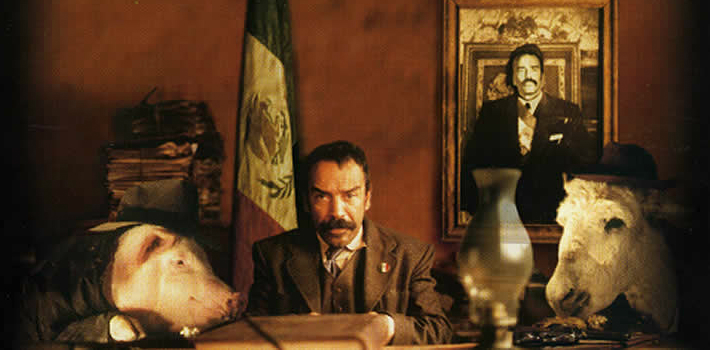
EspañolThe story takes place in San Pedro de los Saguaros, a fictitious town in Mexico, but it well could have been any rural village in Latin America. All the key ingredients are there: a mayor who rules like a feudal lord; a population mired in poverty and ignorance; the brothel everyone denounces and also visits; and the corrupt local church that matches, and perhaps even surpasses, politicians’ dirty deeds.
Directed by Luis Estrada and produced by the irreverent Bandidos Films, the Mexican film Herod’s Law (La ley de Herodes) does without subtleties and outright condemns the guile that reigned in Mexico from 1929 to 2000, under the rule of the Institutional Revolutionary Party (PRI). This was the period in Mexico’s history that Nobel laureate Mario Vargas Llosa deemed “the perfect dictatorship.”
Ironically, the Mexican government tried to halt the release of the film in 1999, ahead of the general election. Nevertheless, the film would go on to earn international recognition and win several awards.
Coincidence or not, following the film’s box-office success, the PRI lost the presidency for the first time in 71 years to Vicente Fox, the National Action (PAN) and Green Party candidate.
“Either Way, You’re Screwed”
This black comedy begins in 1949 Mexico, at the height of the moral decay of the Miguel Alemán administration (1946-1952). After the dissatisfied residents of San Pedro decapitate their corrupt mayor, regional PRI leaders need to place someone in charge until the next elections. They find their man in Juan Vargas, a gullible junkyard supervisor with a blind faith in the party.
Vargas’s idealism and aspirations, including dreams of becoming a congressman, quickly vanish when he and his wife move to San Pedro, a town damned by misfortune. Its 100 citizens barely speak Spanish; there is no light or public schools, or the money to fix one; and corruption runs so deep, even the local priest charges his parishioners a confession fee.
His only staff is an assistant, Carlos Pek. On his first day in office, he must personally bury a local resident murdered at the town’s brothel. The priest then promptly shows up to collect his burial fee, of course.
Desperate to fulfill the PRI’s purported goals of “social justice” and “modernity,” a clownish Vargas seeks the help of State Secretary Fidel López. He requests funds to meet his duties as mayor, or be assigned to another city.
Not a chance, says López. Like it or not, Vargas would have to somehow manage the town all by himself — for his own good. Our protagonist thus discovers Herod’s Law: “Either way, you’re screwed,” says the state secretary.
López sends Vargas back to San Pedro with a pistol and a copy of the Mexican Constitution. “You will soon see how everyone can be shaken down with taxes, tickets, permits… If you use the law the right way, you’ll be all set,” he tells Vargas after a crash course in Mexican politics. “Remember, in this country, those who don’t cheat, don’t get anywhere!”
The Perfect Dictatorship
Vargas learns how to chase riches by playing tax collector. He too soon finds himself reaping the benefits of power. With a monthly tax on the town’s only shop, a permit fee on the brothel, and fines on the town’s drunkard, he collects enough money to invite the town’s most honorable men for dinner and win their trust.
The film’s critique of Mexican politics reaches its peak during a dinner of national representatives. Vargas sits down with Dr. Morales, a political opponent from the PAN party, the priest, the shopkeeper, and a greedy US citizen with whom the mayor has negotiated the construction of power lines.
At one point, Morales asks the US contractor if the United States believes democracy is the cure for countries like Mexico. “No, no,” says the gringo, “we also like dictatorships like yours!” Everyone bursts into laughter, to which the shopkeeper adds: “The perfect dictatorship!” The same phrase would later title the 2010 blockbuster movie by Bandidos Films.
Vargas is quick to defend the PRI’s hegemony: “In this country, votes are respected. It is not our fault that the people always vote for my party.”
After a brief period of joy, misfortune catches up with Vargas when the brothel’s owner (his biggest source of revenue) refuses to pay his taxes. The San Pedro mayor then decides to “exert his authority” by murdering the owner.
Tired of Vargas’s abuse of power, Pek confides in State Secretary López and tells him about the misdeeds that have occurred in the town. When López arrives to reestablish order, Vargas then kills him as well.
Instead of any punishment, however, the PRI rewards Vargas with a seat in Congress. As it turns out, he’s eliminated a dissident faction leader within the party. In the end, the most inept character emerges victorious.
Herod’s Law paints a picture of the true nature of the state: exploitation and impunity. As libertarian theorist Murray Rothbard put it, the state is not a “an amiable, though often inefficient, organization for achieving social ends” as is commonly believed, but rather “the systematization of the predatory process over a given territory.”
Without power, well-intentioned brutes like Vargas can rarely cause much damage on society. A system that is capable of transforming them into vicious oppressors is irredeemably rotten.
 Versión Español
Versión Español












